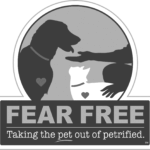Up, Up and Away
July 18, 2012
While I’m on vacation with family this week, my pets are safe at home with a trusted petsitter. It’s just not possible to bring all three of them when we travel. Many pet owners are lucky enough, however, to travel with their pets, whether by plane or car. Small dogs and cats can be brought into the cabin of most airplanes, while larger dogs travel in the pressurized baggage compartment of the plane. Frequently, veterinarians are asked to prescribe tranquilizers for animals that are traveling.
After receiving a request for travel medications, the first question I ask my clients is why do you think Fluffy needs to be tranquilized? Many dogs and cats can and do travel perfectly calmly in cars and planes, showing no evidence of physical or emotional distress. These animals do not need medications for a car or plane ride!
The second question I ask my clients is Does Fido vomit or drool excessively when traveling in the car? If the answer to this question is yes, its very likely Fido suffers from motion sickness. Dogs and cats can develop severe anxiety about travel if they feel nauseous every time they get in the car. Treating these pets with medication for motion sickness can, in turn, alleviate their travel anxiety. Recently, an FDA approved prescription drug called Cerenia has become available for dogs with motion sickness. Cerenia is safe, effective and does not cause drowsiness like Dramamine can. It has been a wonderful drug for families who take carsick Fido on long car trips.
A small percentage of animals do have severe anxiety about traveling in a car, or being kept in a travel carrier. These pets may benefit from appropriate medications. Unfortunately, the reality is that none of the medications we use for this purpose are without side effects. True tranquilizers (such as AcePromazine) essentially just paralyze the body; the dog and cat simply cannot move in response to stress, but these drugs have no effect calming the mind or reducing anxiety. These medications can cause seizures and hypotension (dangerously low blood pressure). Tranquilizers do have a place in veterinary medicine, particularly as an adjunct to anesthesia and surgery. However, I do not frequently prescribe them for travel; if Fido starts seizuring on a plane, there is nothing that can be done to help!
Recently, veterinarians have started prescribing anxiolytic medications such as Xanax for travel. This medication, in the class known as benzodiazepines, can substantially reduce anxiety if given on an occasional basis. Some animals will become very groggy on this medication, and some may paradoxically become more aggressive and agitated; it is often recommended that owners do a trial run with Xanax at home to see how Fluffy tolerates it. It is otherwise a reasonably safe medication, and may be an ideal choice for severely anxious animal travelers.
There are other products available that can help reduce your pets anxiety. DAP (Dog Appeasing Pheromone, available in a product known as Adaptil)comes in a spray bottle and can be used within a carrier, or on your dogs blanket in the car. This pheromone is a synthetic version of a chemical that lactating mothers emit when nursing their puppies, and it is known to have a calming effect on some dogs. For cats, a product called Feliway is available. This is also available in a spray, and in a room diffuser. Feliway is a synthetic copy of a facial pheromone released by cats to mark their territory as safe and familiar. The advantage of such products is that they dont have any side effects!There is no odor that humans can detect, either. These products can be sprayed on your pet’s carrier or blanket, or in the car prior to travel.
The majority of pets can travel comfortably without sedation or tranquilization. And hey, they probably will have more legroom than their human companions!



